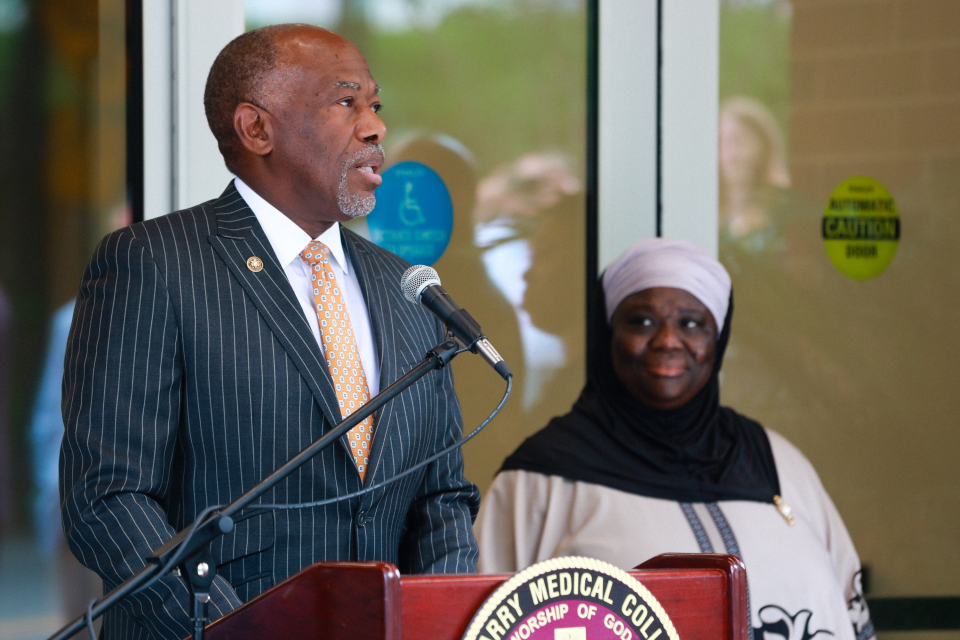Few researchers study genetics of African Americans. What Meharry is doing about it.
A group of international pharmaceutical and genetics companies announced Wednesday they will invest $80 million to create a scholarship and major genetics research program at Meharry Medical College to address the severe shortage of minorities involved in medical science.
The New York-based Regeneron Genetics Center, United Kingdom-based AstraZeneca, Denmark-based Novo Nordisk and Switzerland-based Roche are launching an initiative called "Together for CHANGE" (Changing Healthcare for People of African Ancestry through InterNational Genomics & Equity) to address such inequities.
Their investment at Meharry will include the creation of a genetics research center — The Diaspora Human Genomics Institute — and new educational programs to encourage Nashville-area students to study science, technology, engineering and mathematics (so-called STEM subjects).

This is not merely about minority representation in the fields. Research shows that minorities are under-represented in clinical drug trials, a fact that may affect the efficacy of certain pharmaceuticals and limit the development of new drugs.
Meharry Medical College, a historically Black college, was the first medical school that accepted African Americans in the South.
"This initiative and this institute are historic, both in their intent and their ambition to right past and present wrongs in Black health and to deliver better health outcomes and better lives," Dr. James Hildreth, president and CEO of Meharry Medical College, told an audience of dozens on Wednesday.
Encouraging students to study science
The companies are spending $30 million to fund a K-12 program to encourage children to pursue STEM fields. The initiative will also fund internships for students at historically Black colleges and universities in the area, such as Meharry.
A staffer at the newly created institute, which will be independent of Meharry but will collaborate with it, will oversee the program, Hildreth said.
"Currently, in the STEM fields only 5 or 6 percent of the people who do that work are from minority backgrounds," Hildreth said. "To a large extent, it's true that people tend to work on those problems that are more germane to themselves, their families or their communities. And because we don't have a lot of (minorities) in those STEM fields there are decisions being made and research projects being chosen, research questions being studied that are relevant to all of us but not necessarily relevant to minority communities in eliminating health disparities."
Lyndon Mitnaul, a senior director in the Regeneron Genetics Center at Regeneron, said he benefited from federally funded minority-related academic programs, including the Minority Biomedical Research Support Program, that allowed him to go to college, get internships and develop a successful career.
He said this new program at Meharry fostering internships will be invaluable to minority students seeking to work in STEM fields. They expose students to important research and help students cultivate mentors and other professional relationships, Mitnaul said.
Regeneron on Wednesday also announced a separate $5 million grant to bolster STEM education in Nashville.
"These students will be able to build those critical professional relationships that can change their lives like it did for me," he said.
A new $50 million genetics center
The remaining $50 million will fund The Diaspora Human Genomics Institute. The center is seeking at least 500,000 samples of genetic materials from minority volunteers that will be added to a larger genetic database.
Identifiable information on the donors will be kept locally, in case testing determines the donor has a medical condition that needs to be treated. The institute will also pay for any such needed medical treatment, Hildreth said.
The identity of donors will be stripped from samples that are sent to larger genetic databases, he added. The institute will also establish an ethics committee that includes members of the local Black community to create policies to help ensure the security of the data, Hildreth said.
Researchers say it's important to enjoy increased minority representation in genetic sampling because only 2% of genetic information studied today includes people of African descent. That leaves out a lot of potential genetic diversity that can be studied and used to develop new drugs, they say.
"It's been widely known, the vast majority of (studied) genetics information in the world comes from people of European descent, said George Yancopoulos, president and chief scientific officer for Regeneron. "That causes two problems. One is, the lack of diversity hinders the science. Two is, these people who are not represented represent a huge disproportionate issue in terms of their health care burden. That is, they historically have much poorer health care outcomes. So, we have less information about the people who are suffering more."
Frank Gluck is the health care reporter for The Tennessean. He can be reached at fgluck@tennessean.com. Follow him on Twitter at @FrankGluck.
Want to read more stories like this? A subscription to one of our Tennessee publications gets you unlimited access to all the latest political news, plus newsletters, a personalized mobile experience, and the ability to tap into stories, photos and videos from throughout the USA TODAY Network's daily sites.
This article originally appeared on Nashville Tennessean: Meharry and Big Pharma announce $80 million deal for genetics project

